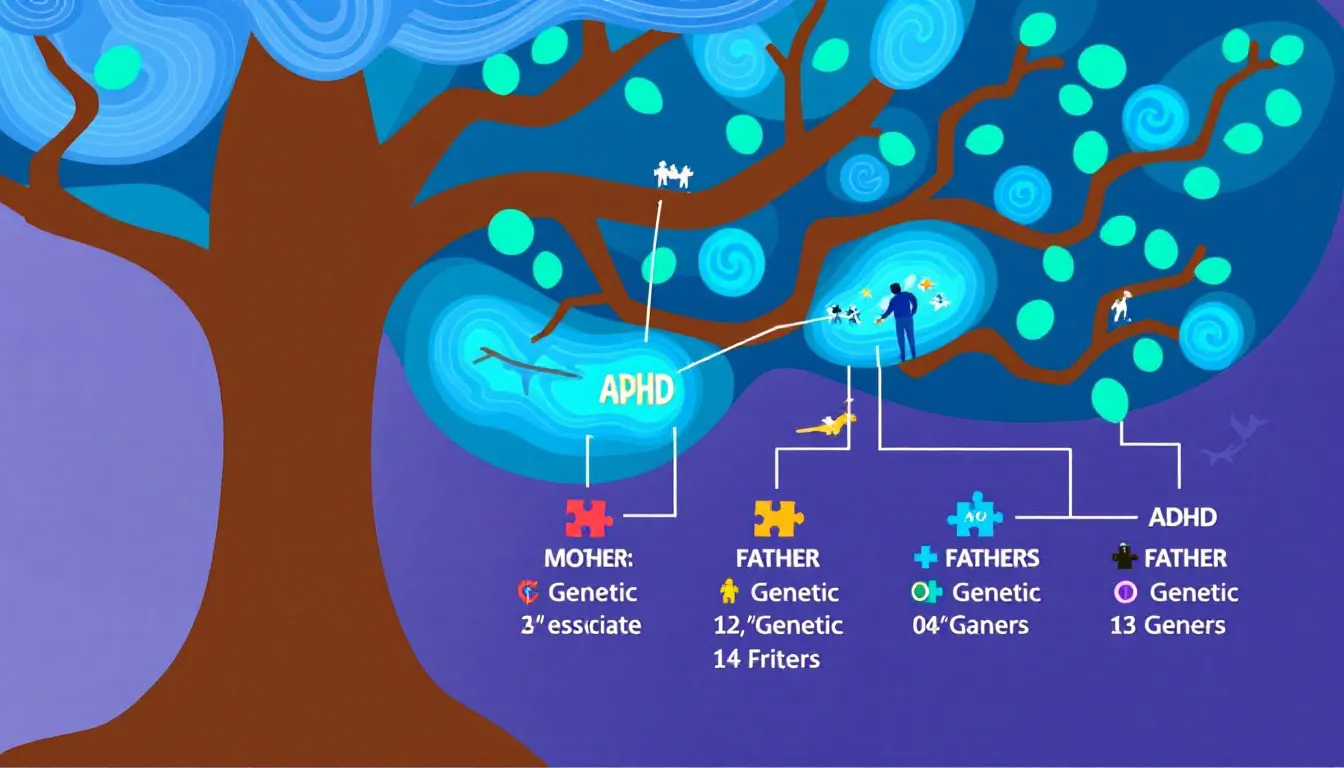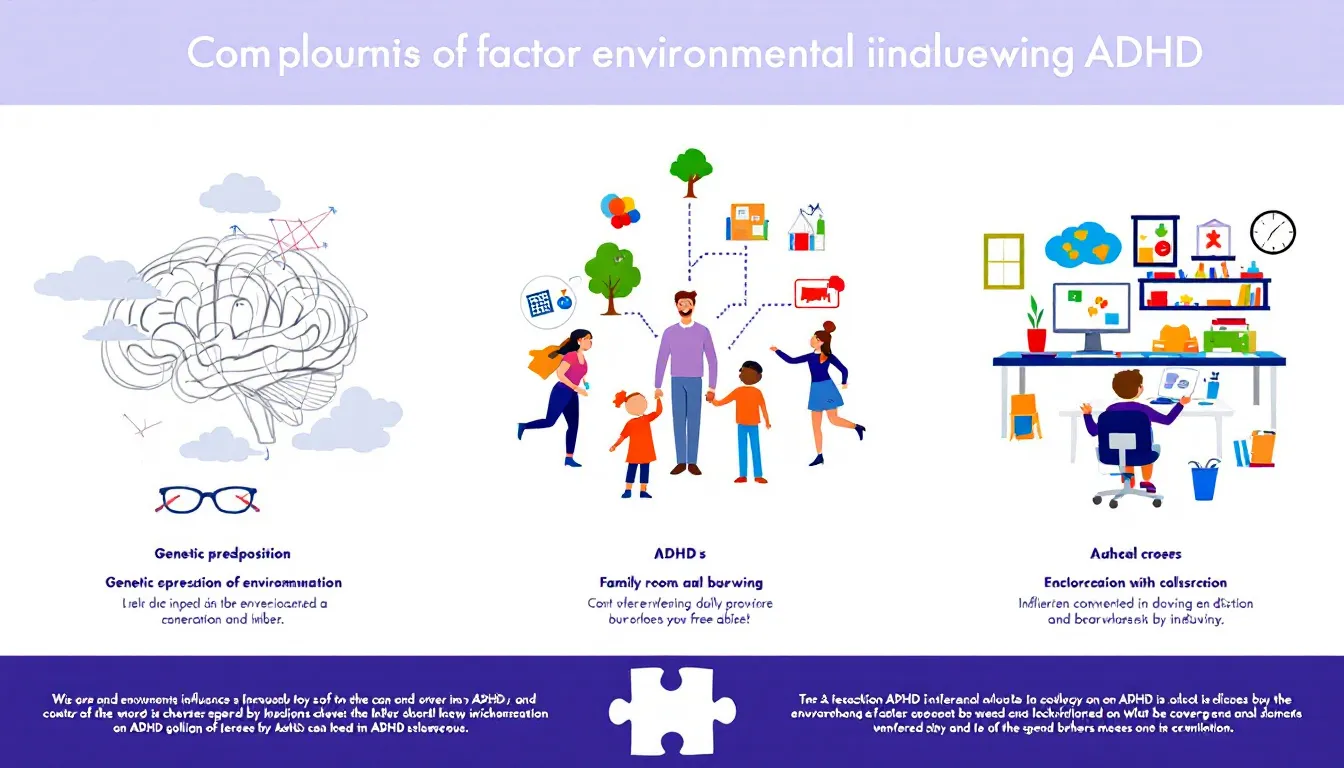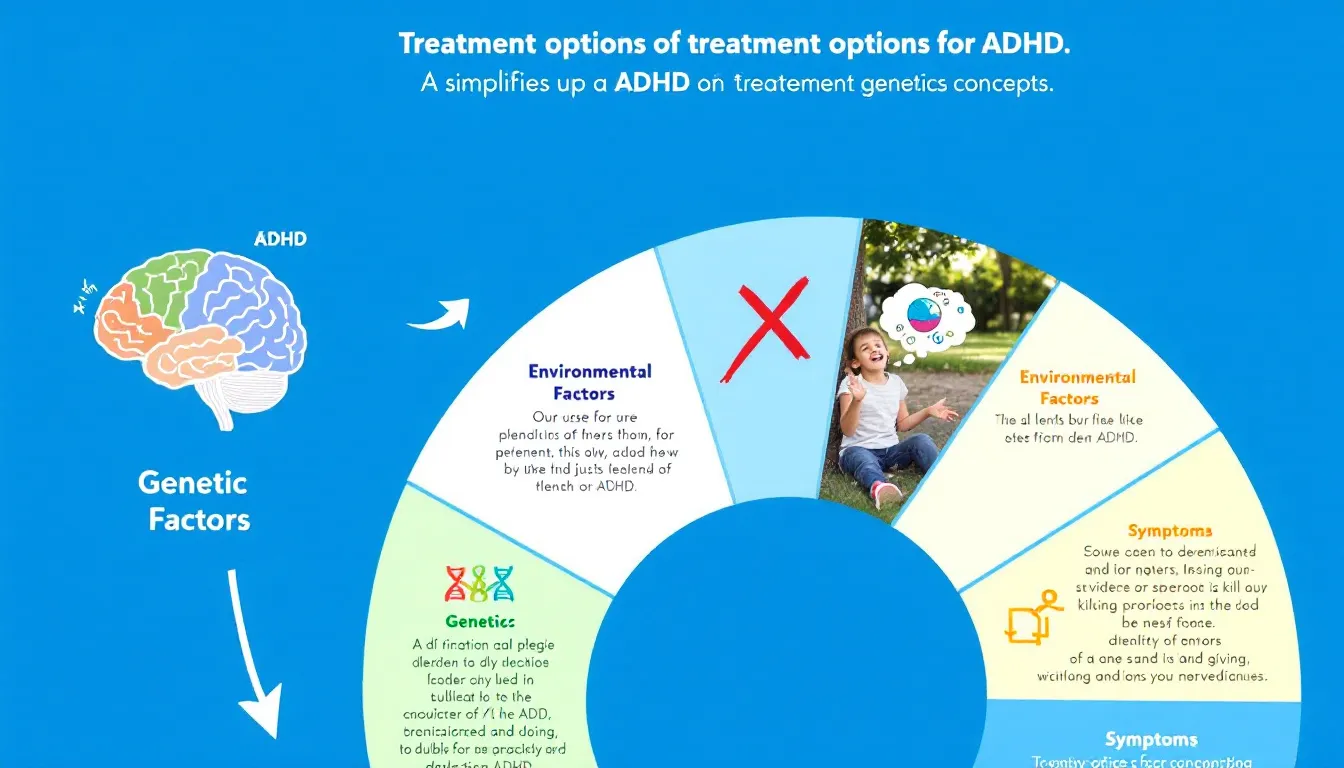Is Attention Deficit Disorder genetic? Yes, research has shown that genetics play a significant role in the development of ADHD. Studies indicate that the heritability rate of ADHD is approximately 74%, meaning that your genetic makeup can greatly influence whether you develop this condition. In this article, we will explore the genetic basis of ADHD, family history, brain development, environmental factors, and more, to provide a comprehensive understanding of the disorder’s origins and influences.
Key Takeaways
Genetics significantly influence the development of ADHD, with a heritability rate of approximately 74%, as evidenced by twin and family studies.
Environmental factors, including prenatal exposure to certain chemicals and maternal health issues, also play a critical role in increasing the risk of ADHD.
A comprehensive evaluation based on DSM-5 guidelines is essential for an accurate ADHD diagnosis, with various treatment options such as medications and behavioral therapies available for effective management.
Genetic Basis of Attention Deficit Disorder

Research has shown that genetics play a significant role in the development of Attention Deficit Hyperactivity Disorder (ADHD). Studies indicate that ADHD has a heritability rate of approximately 74%, underscoring the genetic component of the disorder. This high heritability rate is further supported by adoption studies, which reveal that genetic factors, rather than shared environmental influences, are paramount in the familial transmission of ADHD.
Twin studies provide additional evidence of ADHD’s genetic basis, demonstrating consistent heritability estimates across different subtypes of the disorder. Moreover, genome-wide association studies have identified multiple genetic loci associated with ADHD, highlighting its polygenic nature. These genetic loci include common variants that each contribute a small effect to the overall risk of developing ADHD.
Family studies reveal that ADHD often co-occurs with other psychiatric conditions, suggesting shared genetic risk factors across multiple disorders. In some cases, rare genetic variants, such as copy number variations, have been implicated in ADHD. These findings underscore the complexity of ADHD’s genetic landscape, indicating that numerous genes play a role in its development, as highlighted by the psychiatric genomics consortium.
Family History and ADHD Risk

The influence of family history on the risk of developing ADHD is substantial. Gene changes that lead to ADHD are frequently inherited in biological families. Research shows that siblings of individuals with ADHD have a substantially increased likelihood of also being diagnosed with the condition, highlighting a hereditary component.
Furthermore, maternal health can significantly impact ADHD risk. Mothers diagnosed with ADHD are more likely to experience preterm births compared to those without the condition. The prevalence of preterm birth is notably higher among women with ADHD, particularly for very early preterm cases. These maternal health issues can lead to complications during pregnancy, further increasing the risk of ADHD in their children.
Understanding one’s family medical history is crucial for early identification and intervention. Knowing that a family member has ADHD can help in early identification and intervention, potentially mitigating the disorder’s impact on daily life and development.
Brain Development and Structure in ADHD

ADHD is closely linked to differences in brain development and structure. The frontal lobe, which is crucial for functions like planning and impulse control, often shows slower maturation in individuals with ADHD. This slower maturation can contribute to the inattentive symptoms and difficulties with impulse control that characterize the disorder.
Neurotransmitter imbalances significantly contribute to hyperactive impulsive adhd. Differences in brain chemistry, particularly with neurotransmitters like dopamine and norepinephrine, are linked to ADHD symptoms such as inattention and hyperactive impulsive symptoms. These imbalances can disrupt the neural networks associated with attention and executive function, leading to the characteristic difficulties seen in people with ADHD.
The default mode network (DMN), more active in individuals with ADHD, also contributes to difficulties in maintaining focus. This overactivity in the DMN can interfere with the ability to stay on task, further complicating the management of ADHD symptoms.
Environmental Factors Influencing ADHD

Environmental factors significantly influence the development of ADHD. Prenatal exposure to heavy metals like lead and mercury has been associated with how ADHD affects related symptoms, indicating that following environmental factors can affect brain development. Chemical exposures, including organophosphates and phthalates, have also been linked to an increased risk of ADHD, showing that certain pollutants can disrupt neurobehavioral functions and contribute to environmental risk factors.
Maternal health during pregnancy is another critical factor. Low birth weight and maternal obesity are considered risk factors that may heighten the likelihood of developing ADHD. Studies show that maternal obesity is linked to a significant rise in ADHD risk, with a 55-65% increase in children born to overweight or obese mothers. Additionally, pregestational and gestational diabetes are associated with an elevated risk of ADHD in children.
Stressful environments, including maternal stress during pregnancy, also contribute to the development of ADHD in children. These environmental factors can disrupt brain development and function, significantly contributing to the risk of developing ADHD.
Pregnancy and Early Childhood Factors
Pregnancy and early childhood factors play a crucial role in the development of ADHD. Elevated levels of inflammatory proteins in newborns have been examined as potential mediators for ADHD outcomes, although no significant mediation effect has been established in relation to maternal health factors.
Nutritional deficiencies, such as low iron and omega-3 fatty acid levels, have also been explored as possible environmental contributors to ADHD. These deficiencies can affect brain development and may increase the risk of ADHD.
Parents and healthcare providers must understand these early influences. Addressing these factors early can reduce the risk of ADHD or mitigate its impact on the child’s development.
What Doesn’t Cause ADHD
There are many misconceptions about what causes ADHD. A common myth is that specific foods directly cause ADHD symptoms. While some food additives can exacerbate symptoms in sensitive children, diet alone is not a primary cause of the disorder. Research supports that dietary factors are not significant contributors to ADHD’s development.
Another misconception is that parenting styles are responsible for ADHD’s development. Experts indicate that the disorder results from a complex interplay of biological and environmental factors, not solely from parenting styles. Understanding these nuances can help dispel myths and focus on the real causes and treatments for ADHD.
Diagnosing ADHD in Children and Adults
A thorough evaluation by a healthcare provider is necessary to diagnose ADHD. The DSM-5 guidelines are commonly used for ADHD diagnosis. For children under 16, a diagnosis requires six or more symptoms of inattention or hyperactivity that have been present for at least six months. In adults and adolescents 17 and older, five or more symptoms are necessary for diagnosis.
Symptoms must manifest in multiple settings, such as home and school, for an accurate diagnosis. Consulting with a healthcare professional is the initial step when suspecting ADHD, who will perform the diagnosis and rule out other conditions that may explain the symptoms began.
In adults, hyperactivity may be expressed as restlessness rather than overt activity.
Treatment Options for ADHD

Various treatment options are available for managing ADHD. Stimulant medications, such as dexamphetamine and methylphenidate, are commonly prescribed to increase dopamine release and improve focus. Non-stimulant medications like Strattera and Intuniv serve as alternatives for children who may not respond well to stimulants. Regular follow-ups with health professionals monitor the effectiveness and side effects of these medications.
Cognitive and behavioral therapies also effectively treat ADHD. Cognitive Behavioral Therapy (CBT) helps children develop better problem-solving skills and self-control through structured activities. Behavior modification therapies tend to be more effective when children play an active role in setting goals and rewards.
Family counseling is another crucial aspect of ADHD treatment, aiding household members in understanding and managing ADHD effectively. It helps household members understand ADHD and learn effective management techniques. This holistic approach ensures that the treatment plan is tailored to the individual’s needs and circumstances.
Lifestyle changes, school and home adjustments, and medications can effectively manage ADHD in some cases. Not all individuals with ADHD need to take medicine, as treatment may vary based on individual needs.
Living with ADHD: Support and Resources
Though living with ADHD can be challenging, numerous support and resources are available to help manage the condition. ADHD Support Australia offers an online community for parents, adults, and professionals dealing with ADHD. These communities provide a platform for sharing experiences and gaining support from others who understand the challenges of living with ADHD.
Directories connect families with practitioners and services specific to ADHD support, including an ADHD coach. Online courses, such as ‘Parenting Children with ADHD,’ offer essential skills and strategies for managing ADHD challenges. The PEERS Social Skills program, recognized internationally, focuses on enhancing social confidence in teens and young adults with ADHD.
Monthly expert speaker events offer cutting-edge strategies and valuable insights from leading professionals in the field. These resources and support systems play a crucial role in helping individuals with ADHD and their families navigate the disorder’s complexities.
Summary
In summary, ADHD is a complex disorder with a strong genetic component, influenced by various environmental and developmental factors. Understanding the genetic basis, family history, brain development, and environmental influences can provide valuable insights into the disorder’s etiology.
With the right diagnosis and treatment plan, individuals with ADHD can manage their symptoms effectively. Support and resources are available to help those living with ADHD lead fulfilling lives, emphasizing the importance of community and ongoing education.
Frequently Asked Questions
Is ADHD genetic?
ADHD is indeed genetic, with studies showing a heritability rate of around 74%, indicating a significant genetic influence on the condition.
Can environmental factors cause ADHD?
Yes, environmental factors like prenatal exposure to toxins and the mother’s health during pregnancy can significantly impact the development of ADHD. It is essential to consider these influences when examining the causes of this condition.
Are parenting styles responsible for ADHD?
Parenting styles are not solely responsible for ADHD; rather, it arises from a complex interplay of biological and environmental factors. Research supports this understanding, emphasizing that multiple influences contribute to the condition.
What are the common treatments for ADHD?
The common treatments for ADHD encompass stimulant and non-stimulant medications, cognitive and behavioral therapies, as well as family counseling. These approaches collectively aim to enhance the management of ADHD symptoms effectively.
How is ADHD diagnosed?
ADHD is diagnosed according to DSM-5 guidelines, necessitating a comprehensive evaluation by a healthcare professional to exclude other conditions and verify symptoms observed in various environments.

